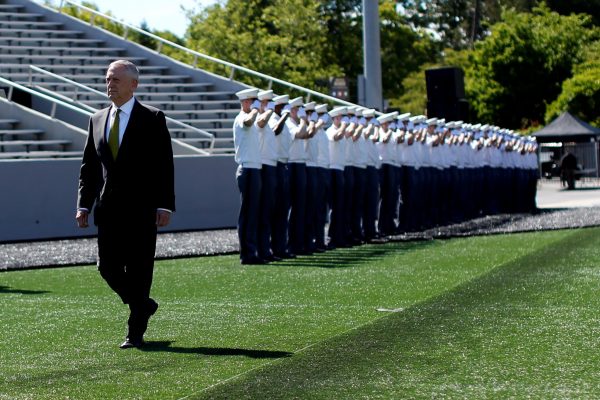This year, that won’t be so easy. As usual, the US Secretary of Defence will deliver a major speech when the meeting convenes at the start of June. But it is far from clear what James Mattis will have to say. The new administration does not yet have any clear policy lines on Asia, nor has it appointed or even nominated any of the senior officials who would be responsible for framing such a policy.
The Obama-era ‘pivot to Asia’ slogan is dead, but something bigger is happening than just a change in terminology. Despite tough talk during last year’s election campaign, and some notably anti-Chinese appointees in the White House, Trump seems to have no appetite for confronting China. He has stepped back from threats of a trade war, and is seeking cooperation with Beijing over problems like North Korea.
The issue to watch at this year’s meeting is the South China Sea. China’s conduct there was the central focus last year. Washington urged Asian countries to stand up to Beijing, and promised robust US support. But that has all fallen rather flat since then. China has ignored the Law of the Sea Arbitral Tribunal’s adverse findings, the United States has failed to follow through with robust freedom of navigation operations, and ASEAN countries have each performed pivots of their own — towards China.
Trump’s team had seemed prepared to quietly let the issue drop. Washington reportedly refused to authorise further freedom of navigation operations, until last week’s USN transit near Mischief Reef, which was handled in a notably low key manner. Under Trump criticisms of China’s position on the South China Sea have been largely absent from official statements as the focus has shifted to North Korea.
That might be smart, because the way things have turned out the South China Sea has not played to the United States’ advantage. Mattis would be foolish to repeat his predecessor’s mistakes and promise tougher pushback against China than Washington is willing or able to deliver.
But tacitly accepting Beijing’s fait accompli in the South China Sea would leave a big question mark over Washington’s longer-term objectives and strategies in Asia. US allies would have to ask how seriously committed the Trump administration is to preserving the US regional strategic primacy on which their security depends.
This question is no doubt weighing on the mind of Australia’s Prime Minister Malcolm Turnbull as he prepares to deliver the keynote opening speech at Shangri-La this year. Turnbull has pondered deeply the significance of China’s rise for Asia’s future and the United States’ role in it. But since becoming prime minister 18 months ago, he has not made any major speeches on the issue.
The Shangri-La speech thus offers an important opportunity for Turnbull, and a daunting challenge. He can establish himself as a real regional thought leader by setting out his carefully considered views on the radical transformation of Asia’s strategic order being driven by the rise of China.
Or he can stick to platitudes, and pretend that nothing has changed. That is what his predecessors in Australia have done, and it is mostly what other regional leaders in Asia have done too. They have been understandably nervous that to speak out more frankly would anger the United States, unsettle their own citizens, and encourage China.
But by failing to engage in a serious and honest debate about the region’s tectonic strategic shifts, Asian leaders have prevented any proactive response. The reality is that Trump really is all about ‘America First’. So Turnbull should speak his mind in Singapore next week. That would not mean repudiating a continuing strong US role in Asia, or Canberra’s close bilateral alliance with Washington. But it would mean saying out loud and quite plainly what everyone already knows.
First, China’s rise is a massive and permanent shift in the distribution of wealth and power in Asia, and none of China’s political or economic challenges, serious though they are, will change that.
Second, this shift in power must change the way Asia works strategically. The old order based on uncontested US primacy has already gone. A new order is emerging in which China does and will play a bigger leadership role. So will other Asian countries as their power grows.
Third, the challenge for Asia is not to try to prevent or roll back strategic change, but to manage it. We need to manage the transition to a new order peacefully, and ensure that as it emerges, the new order effectively protects the key interests of all of us.
Asia benefits if the United States can play a major role in the new order, but that role will be different from the one it has played hitherto. Asia needs to help the US reimagine a new role for itself which serves the wider regional interest, and which it is able and willing to sustain. Otherwise we may find that the US simply withdraws.
If Turnbull could bring himself to say something like that, this year’s Shangri-La really would be historic.
Hugh White is Professor of Strategic Studies at the Strategic and Defence Studies Centre, The Australian National University.
An earlier version version of this article was first published here in The Straits Times.


Trump’s statements about China portend big changes to be sure. And his actions on his just completed trip to the Middle East and Europe created ripples still being felt.
It will be interesting, indeed, to see what PM Turnbull says in the next few days. And even more important what he and the leaders of other Asian Pacific nations begin to do in relationship to the USA and the PRC.
Please do a follow up on Turnbull’s speech and those made by other leaders.